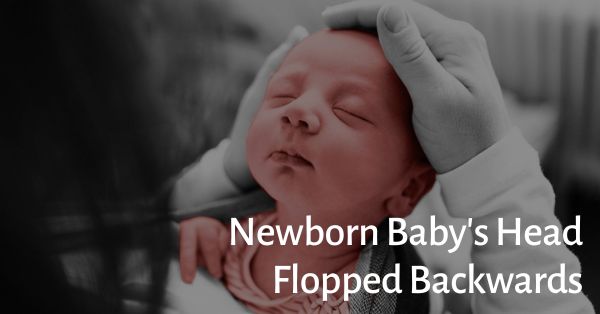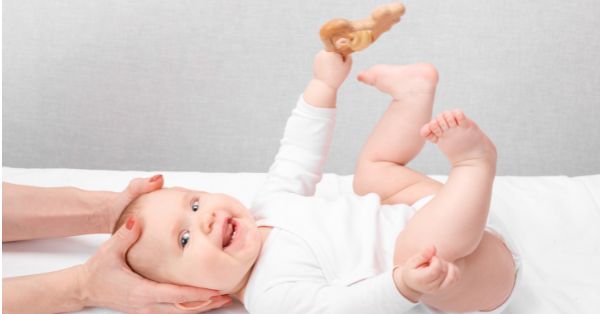It’s normal to feel scared and hesitant when holding a fragile and tiny newborn baby and learning how to safely handle them and prevent hurting that flimsy head and tiny little limbs may take time. If your newborn baby’s head flopped backwards then you’re going to wonder, do I need to panic that it’s caused damage to their muscles or brain?

What Happens If My Newborn Baby’s Head Flopped Backwards?
Your newborn’s head and neck muscles will be fragile for the first few weeks and months of their life which is why you need to make sure you fully support them at all times to avoid the risks of brain injury or damage to their muscles.
If your baby’s head flopped backwards once then make sure to keep an eye on them for any unresponsive or inconsolable behaviors and contact your doctor straight away if you are worried.
Supporting Your Baby
Your body has cradled and nurtured your growing baby for your whole pregnancy and their adorably tiny body that once felt so cramped in your tummy will seem incredibly small once you welcome them into the big wide world! The mixture of physical and emotional changes your body goes through in the first few weeks and even months of having your baby can be overwhelming.
Not every single parent will instantly know how to safely handle and support their baby’s tiny body, and it took me a long time to realize that a lot of us are winging it the majority of the time. With all the anxiety I felt about ensuring my child was constantly safe and comfortable, I still worried that maybe I wasn’t holding them the best way.
Understandably, you may feel nervous holding your baby from the very start but cuddling and supporting your newborn is one of the best ways to settle and reassure them as they get used to being out of the safe, warm, and dark conditions they knew in your womb.
As I’d watch my baby being held it put into perspective just how tiny and vulnerable they are and seeing their newborn head flopped backwards filled me with fears and made me wonder what happens if you don’t support a baby’s head.
Baby’s Head Fell Back Unsupported – Can It Cause Damage?
If your newborn baby’s head flopped backwards then it is unlikely to cause any damage from a singular incident, but there are some scenarios you may not be aware of that could cause damage to their necks.
In the long-term, a lack of support and care for a baby’s small developing body can cause a range of problems as they develop. Although rare, if your little one is regularly in a baby carrier or car seat that isn’t appropriately supporting their body then this can cause injuries over time as it creates additional strain on the developing muscles.
Sometimes these consistent injuries can result in serious damage. A momentary scenario in which your baby’s head flopped backwards isn’t very likely to cause any of these scenarios, but holding your baby incorrectly or not following safe sleep practices is a big risk.
‣ Suffocation
One of the biggest concerns you hear about from the very beginning is suffocation. The risk of a baby suffocating is much higher as they haven’t got the control and coordination to move themselves, so it is up to the parent to ensure they place or hold the child in a safe and contained way.
Improper head holding can result in your infant’s head flopping forwards and cutting off the airways, resulting in suffocation. Whenever you place your child down, make sure they are on a flat surface and have a safe sleep environment.
‣ Neurological Issues
Sadly, shaken baby syndrome is a common form of trauma that many infants face and has a huge impact on their wellbeing. This can result in seizures and impaired sensory and motor skills.
The damage caused to their brain can result in lifelong issues from such a young age, but fortunately, damage to an infant’s developing brain isn’t usually caused by an accidental head flop. Be sure to keep an eye out for the signs if it has happened several times always contact your doctor or child health specialist to get accurate advice based on your individual child’s needs such as low birth weight, prematurity, or birth complications.
‣ Brain Damage
Even just 20 seconds of unsupported vigorous movement to your infant’s head and neck can result in serious brain damage. Again this is usually seen more commonly with shaken baby syndrome, but any movement that causes the brain to move back and forth in the skull without support repeatedly can cause serious developmental brain delays.
When Do Baby’s Neck Muscles Develop?
When your baby is born its head will be huge in comparison to the rest of that adorably little body, but this means they won’t be able to hold their heads up and safely support themselves as they have no muscles or strength yet.
As a new parent you learn very quickly you need to support their neck and head at all times whether their feeding, cuddling, or playing. You’ll quickly adapt to the ways you need to hold and support your bundle of joy, but this might not be the same for eager family members who forget just how small and fragile a baby is.
But, before you know it, those precious early weeks and months will have passed by and your not-so-little baby will be able to support their head, and even sit unassisted! The days might seem long, but the weeks are fast.
You might even notice by around one month old your little one attempts to raise and move their head without any support! This is crucial in the development of their shoulder, back, and arm muscles.
By around the age of three months old, your baby will gain control of their head when they’re being supported to sit. With regular tummy time, your little one will have an opportunity to strengthen those developing muscles and gain the ability to lift their head.
At around four months your little one will start lifting their head much more often and their chest will partially raise off the floor as well. Their vision develops further at this age which makes lifting their head much more interesting to them!
By six months, your child will be able to sit unassisted and have enough strength in their upper body to do so with minimal effort. They’ll start mastering the ability to turn from side to side as well as up and down which you can work on together through a range of fun activities!

Strengthening Your Babies Neck Muscles
Although it is completely normal to be worried when a baby’s head flopped backwards, there are ways you can work to strengthen their neck muscles from the very start to ensure they’re developing as expected.
When your newborn is still tiny, you might think playing and strengthening their neck muscles isn’t possible, but there are ways. Your little one will still want to be closely held by you at all times, so placing them on your chest when they’re fed and happy is a great way to introduce tummy time as well as soak up all those cuddles whilst giving your body time to recover.
As your little one gets older you can introduce fun activity mats that will encourage your child to lay on their front and look at the shapes and colors around them. Some even include a hanging feature that your baby will enjoy looking up and turning their head to look at.
Even if you haven’t reached 6 months and started weaning your baby, a lot of high chairs on the market can be reclined slightly or adjusted to support your baby. Make sure your baby is safely strapped in to support them and they will be able to practice holding their head level.
The American Academy of Pediatrics suggests that a baby with weak or poor neck muscles should be checked by a pediatrician to check for any developmental or motor delays.
All children develop at their own pace, but if your child cannot hold their head up unsupported by the age of 4 months then it can suggest the presence of certain conditions such as
- Motor delays
- Neuromusular disorders
- Muscular Dystrophy
- Cerebral Palsy

Wrapping Up
Seeing your newborn baby’s head flopped backwards for the first time is nothing less than petrifying, but rest assured that these little bundles of love are extremely resilient and an accidental lack of head support is strongly unlikely to cause them any long-term damage or medical conditions.
As long as you make sure your child has safe sleeping conditions, is properly supported in their car seat or baby carrier, and has plenty of opportunities to strengthen their neck, back, and shoulder muscles then don’t worry, you’re doing great.
More to read: